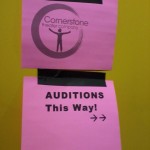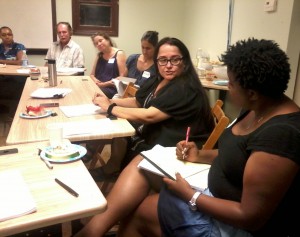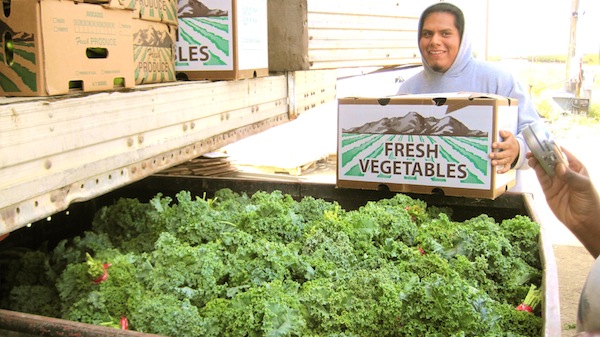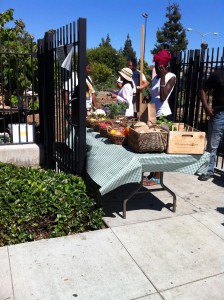August 25, 2012
SEED: A Weird Act of Faith, Sprouting to Life in South LA
In June, ArtPlace awarded Cornerstone a $342,500 grant supporting our Hunger Cycle, a six-year series of world premiere plays about hunger, justice and food equity issues. SEED: A Weird Act of Faith, the second play in The Hunger Cycle, is sprouting to life in South LA. The process of rallying interested community participants is well underway, including the auditioning of local community members for roles in the play.
Raquel Gutierrez, Manager of Community Partnerships, spoke to ArtPlace about the latest in our process of community engagement for SEED and our expectations for viable change through the exciting collaboration between community and art. This blog marks the first of a year-long discussion between ArtPlace and Cornerstone about The Hunger Cycle.
ArtPlace: What is your elevator pitch when you describe your project to people?
Raquel: We here at Cornerstone Theater Company are doing a project that tells the story of agriculture in rural and urban contexts with communities in South Los Angeles. That project is a play written by Sigrid Gilmer and it’s called SEED: A Weird Act of Faith. It’s a conversation centered on accessible healthy foods and community sovereignty, especially when that community is tired of being told it is a “food desert.” We’re also hoping to expand the conversation through actual distribution of fresh fruits, herbs and vegetables to communities that partake of our artistic offerings. And, in remaining true to our bridge-building mission, this endeavor is also a way for self-avowed Angelenos to have more of an understanding about the different neighborhoods that constitute South Los Angeles, as well as the sustainability practices already in place.
Los Angeles is like a really healthy person walking around with a right arm infected with gangrene (South Los Angeles) and not doing anything about it. That metaphor was introduced to me during my stint as a Community Scholar, a class offered to community organizers, labor researchers, and artists along with public health and urban planning students from UCLA’s School of Urban Planning. I was really troubled by that metaphor but decided to harness that discomfort to impel me to talk to as many people that live in South LA that were interested in telling their story and see it possibly come to life through a staged production.
ArtPlace: How do you expect to increase vibrancy in the place you are working?
Raquel: We expect to create vibrancy by being an artistic buoy for and with our community partners and their membership base. These partners include South Central Farmers, Community Services Unlimited, the Community Market Conversion Program and The RootdownLA. These organizations are peopled by some of the most brilliant and passionate strategists that continue to invigorate the conversation when it comes to bringing healthy food and lifestyle to the communities in South LA. Cornerstone wants to convey these passions, tensions, lessons and possibilities through movement, text, image and sound. It’s been eye-opening as well as heart-expanding to learn hands-on about our partners’ work throughout the span of our engagement activities. Our work here as artists is to be of service to community members’ stories, which underscore this organically emerging partnership and friendship.
ArtPlace: What do you have to do really (really) well to achieve success with your initiative?
Raquel: We have to be our most authentic selves to achieve our initiative. You see, only a small number of us here at Cornerstone actually live in South Los Angeles. We hardly, personally, experience food scarcity and little access to the freshest produce our great state of California offers each week. We all have farmers markets we love to frequent, exchange recipes and boast about baking experiments we do over the weekend when we’re away from the office. We reap the benefits of living so close to our produce and are so grateful for the men, women (and sometimes youth) that engage in the backbreaking work of picking the fruits and vegetables that end up on our dinner tables.
We’ve all known different kinds of hunger—in our relationships, spiritual lives and careers. But we don’t know the stigma of living in a food desert. We do know, however, that we need to be in service to those that want to present a different scenario, an alternative to the food desert motif that has circulated in our national discourse around food accessibility. We have to create the conditions that allow for our own transformation as artists and organizers at the hands of community members.
 The lot of us comes in to these communities as strangers. We’ve learned over the years to come inside a community with palms stretched open and to resist the impulse to close them into fists with assumptions. As a theater company, we know how to throwdown—we make a high quality theatrical product. But the process is always about what the community is interested in talking about and how they take us, artists and theater-makers, under their wing to show us who they are.
The lot of us comes in to these communities as strangers. We’ve learned over the years to come inside a community with palms stretched open and to resist the impulse to close them into fists with assumptions. As a theater company, we know how to throwdown—we make a high quality theatrical product. But the process is always about what the community is interested in talking about and how they take us, artists and theater-makers, under their wing to show us who they are.
ArtPlace: How do you expect the community to change as a result?
Raquel: Having an art-making experience with a team of professional artists often lends itself to being a time for transformation. Creating art is often a moment of meditation and for taking inventory of one’s life. Some of our community members of productions past have often used their experience with Cornerstone as an opportunity to ask themselves if they are truly pursuing a path of happiness and satisfaction. Making art in a community-based context is anchored in healing the wounds that galvanized a community to come together in the first place. With our current community partners, we aim to facilitate their membership base to ask questions and inspire them to live the answers first on-stage and then in real life.
ArtPlace is a collaboration of twelve of the nation’s leading foundations, eight federal agencies including the National Endowment for the Arts, and six financial institutions to accelerate creative placemaking across the U.S.
Find out more about SEED: A Weird Act of Faith









